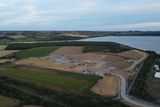Irishman Looney 'eyeing green overhaul' after taking helm at BP
Green ambitions: BP’s Bernard Looney
Incoming CEO Bernard Looney plans to expand BP's climate targets, and is considering overhauling the structure of the oil and gas major in one of the biggest shake-ups in its 111-year history.
The 49-year-old Irishman plans to adopt broader carbon emissions reduction goals that will likely include emissions from fuels and products sold to customers, rather than just the far lower emissions from BP's own operations, according to four sources.
The aim is to catch up with, and possibly outdo, rivals such as Royal Dutch Shell and Repsol, as investor pressure over climate change mounts, said the sources.
More stringent climate targets could lead to London-based BP selling its most carbon-intensive businesses, such as oil and gas fields in Angola and Canada, they added.
As part of the climate push, Mr Looney is also looking at a broad reorganisation of the company aimed at cutting costs, with one idea being explored to merge parts of the upstream oil and gas production division with refining and petrochemical operations, said five sources.
The new CEO and his team of close advisers have held an intensive series of closed-door meetings in recent weeks to outline the new strategy, according to three of the sources.
They said he would outline his ambitions for the company in a speech on February 12, a week after he takes over from Bob Dudley.
It is unclear if Mr Looney has decided to adopt any structural changes at this stage. A BP spokesman declined to comment.
Any new strategy would require a fine balancing act though, and is not without risk for a company whose pioneering efforts in the early 2000s to build a large renewables business, branded Beyond Petroleum, ended with huge losses.
BP would have to rely on revenue from an expanding oil and gas business to fund its green ambitions, while maintaining the generous dividends that keep investors on board. Some industry experts say that business model may not be sustainable in a low-carbon future.
They also point out that BP's emissions are rising, as its oil and gas exploration and production activity expands, while it spends just a fraction of its investment pot on renewables and low-carbon technologies.
"Looney is coming in at a crucial moment for the oil sector," said Morgan Stanley's global oil analyst Martijn Rats.
"Over the next decade, companies like BP will need to maintain supply of oil and gas, for which demand is continuing to grow. That will require ongoing investment. At the same time, they will need to prepare for a decarbonised future.
"All the while, their investors will ask them to keep up these large dividend payments. Balancing these three demands will be the key challenge."
Mr Looney, who is known for his energetic management style, wants to go beyond the carbon reduction targets that were set by Mr Dudley in 2019, and limited to emissions from BP's own operations.
The new targets will likely encompass, for the first time, emissions from the fuels and products sold, known as Scope 3, which account for nearly 90pc of BP's total emissions, according to the sources.
BP's current targets are to reduce emissions from its own operations to net zero by 2025, equivalent to cutting 3.5 million tonnes of CO2 compared with 2016.
It also agreed in a resolution adopted by shareholders to align its business with the 2015 Paris climate agreement goals.
It is not clear what reduction targets the company could set for its Scope 3 emissions. The goals are, however, expected to be detailed at a strategy day later this year, the sources said.
Mr Dudley, who became CEO almost a decade ago following the Deepwater Horizon rig disaster in the Gulf of Mexico, had long resisted setting Scope 3 targets, arguing the company could not control how its fuels were being used.
While Mr Looney receives a financially solid company, he faces fierce pressure from shareholders and activists to do more to meet UN-backed goals to limit global warming.
In Britain in particular, BP faces regular protests and calls for boycotts.
Join the Irish Independent WhatsApp channel
Stay up to date with all the latest news














